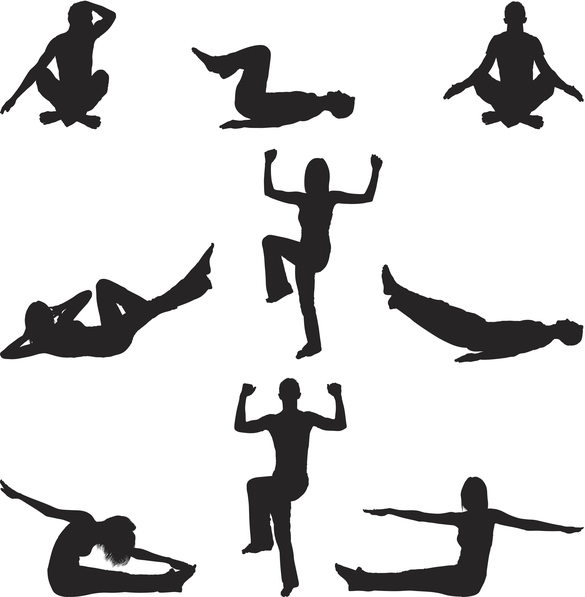You have /5 articles left.
Sign up for a free account or log in.

iStock
In high school, I was an avid reader of popular fitness magazines, particularly because I had the superficial goal of developing six-pack abs. After thousands of sit-ups and no sign of toned abs, I realized that the advice in those magazines was often simplistic, incomplete and/or false.
Wow! Apple cider vinegar will help me lose weight? Oh, wait -- the columnist has an online certificate in nutrition from the Hogwarts School of Witchcraft and Wizardry. If I follow this A-list celebrity’s workout, I may add 15 pounds of muscle by the new year! Darn, the author forgot to mention Mr. Hollywood’s access to a private chef, personal trainer and pseudopharmacist.
If you have sought advice from career columns on how to land your first industry (a.k.a. nonacademic) job, you might notice similarities with fitness magazines. Some career advice “experts” are often just as guilty as fitness gurus of peddling quick fixes or misleading solutions to challenging problems. The flimsy career advice might include the obvious (proofread your résumé), the vague (network, network, network) or the outdated (walk your résumé to the hiring manager). In some extreme cases, career columnists package advice in a way that appeals to our fears and insecurities (e.g., using exaggerated and unsubstantiated claims about how most Ph.D.s in academe will wind up unemployed). Reading and following this advice can be frustrating, because it is often shallow and usually fails to deliver results.
In the face of this glut of unhelpful advice, the Graduate Career Consortium and Inside Higher Ed created the “Carpe Careers” blog to ensure a reliable, positive, unbiased source of useful career guidance for graduate students and postdocs. In the last two years, nearly 50 authors who work directly with Ph.D. students and postdocs have contributed pragmatic advice on multiple career and professional development topics.
However, while “Carpe Careers” bloggers have taken an oath to provide a vision of optimism to our readers, we also try to present a candid view of the challenges that Ph.D.s and scholars will face on the job market. The bottom line is that finding your first nonacademic job will be hard. Maybe it will not be as difficult as developing rock-hard abs, but it will nevertheless be an intense process. Coincidentally, at least five strategies that can be used to tone your abs and get in shape can also be used for finding your first nonacademic job.
Expose value hiding beneath the surface. In order to develop six-pack abs, you must first establish a plan to reveal the muscles hiding beneath adipose tissue, a.k.a. fat. Therefore, a good plan involves aerobic exercise and diet. Similarly, Ph.D.s and postdocs have value hiding under the surface of massive academic CVs with endless lists of publications, presentations and awards. While you should be proud of these accomplishments, merely listing them fails to convey skills that employers appreciate, including leadership, collaboration, problem solving and communication.
Fortunately, revealing such skills will not require miles on a treadmill and a diet of kale and water. It will, however, require thoughtful introspection and feedback from others, so you can prove you possess these qualities by showing how the use of a certain skill led to a tangible outcome.
In order to communicate your value, start with honest self-assessment to determine your strengths. I recommend myIDP, Imagine Ph.D. or Strengths Finder. Focus on the skills you are developing in and outside your research. Next, ask the people with whom you have worked to provide specific examples of when you have used your strengths. As you conduct this assessment, record instances of when use of a skill set led to an accomplishment.
For instance, Ph.D.s and postdocs frequently negotiate in their day-to-day life but fail to realize that they are doing so. After assessing his strengths, one postdoc realized that he negotiated at least once a week. One bullet on his résumé read, “Negotiated with external vendor to cut maintenance contract for core piece of equipment by 20 percent; saved lab $1,000 a year.” Just as sumo wrestlers and offensive linemen have powerful yet hidden abs, most academics already possess extremely valuable skills that employers treasure.
Establish core strength. A mistake that most people make when attempting to develop washboard abs is concentrating only on the rectus abdominis muscle, which is the most visible muscle that gives that classic six-pack appearance. But the fact is you must focus on all muscles in the midsection to develop core strength, which will ensure both an aesthetic and functional midsection that supports the spine and trunk. While Ph.D.s already have many core skills, they often lack other essential ones needed to succeed beyond the ivory tower. Those skills include financial acumen, the ability to communicate with nonexperts and conflict resolution.
Fortunately, there are several easy ways to develop these skills. For instance, if you are interested in developing basic finance skills, I recommend taking an online course from the University of Michigan or the University of Pennsylvania. Moreover, many universities also offer workshops on communication and leadership; my office at Memorial Sloan Kettering provides several on communication and leadership to our students and postdocs.
But taking classes is only the first step. After gaining basic knowledge, you should find ways to demonstrate how it helped you achieve tangible goals. Maybe you used the concept of return on investment to make a decision about investing in a resource or piece of equipment to advance your research. Or maybe you used your communication and conflict resolution skills to resolve a dispute between the postdoc association and university. Developing these core skills will help differentiate you from your competition when applying for jobs.
Identify bad habits. Hitting the snooze button instead of waking up early to work out, bingeing on carbohydrates and training erratically are just some of the bad habits that keep people from achieving their fitness goals. Comparably, habits learned while in academe, including missing deadlines, constantly expanding project goals, obsessing over details and poor time management can also hinder a successful transition into a nonacademic career. One postdoc who recently became a management consultant shared that he succeeded by learning to lead with the impact of his findings first and providing evidence when asked, because CEOs and senior executives don’t always have time for the details.
How many times have you worked on a research project with a goal of publishing by a specified date, only to wait another six months? While shifting deadlines are a direct result of the nature of research, some academics have difficultly adhering to deadlines in their first industry job. Outside academe, missing deadlines leads to wasted resources or lost business.
Attributing such habits to academics is often unfair. However, some people outside academe perceive that academics possess these qualities, and since perception is reality, academics must dispel stereotypes. Once you identify these habits in yourself, draft and record short stories to prove you know how to function outside an academic institution.
For example, one postdoc created a bullet on his résumé that read, “Completed three concurrent collaborative research projects on time and under budget by establishing benchmarks and deadlines at project inception; published projects in two journals and used preliminary data to receive grant funding.” This succinctly telegraphs to an employer that the candidate is capable of creating and meeting deadlines. For additional reading on dispelling academic stereotypes, check out the last chapter in Peter S. Fiske’s book Putting Your Science to Work (American Geophysical Union, 2000).
Work smarter, not harder. Many eager people start an exercise and diet program without taking time to understand basic anatomy, physiology and nutrition. They may conduct countless reps of ineffective exercises or fail to get appropriate levels of rest to allow for muscle repair and recovery. In some cases, a diligent work ethic can be counterproductive, when uninformed or haphazard training leads to injury and fatigue.
I often see similar unfocused enthusiasm when academics attempt to transition into industry. Most Ph.D.s and postdocs that I have encountered are extremely persistent -- a person can’t get through six-plus years of graduate school without hard work. But while most academics apply this same work ethic to the job search, some start their journey by submitting hundreds of applications for any remotely suitable position they come across. That strategy is not only ineffective but also could be harmful, especially if they apply to multiple positions at the same company, which could demonstrate a lack of focus. When applying for nonacademic jobs, you should direct your energy toward building relationships with professionals who work in your chosen industries.
So the next time you have the urge to blindly apply for jobs, I encourage you to redirect this energy as follows:
- Reach out to every student and postdoc your mentor has trained who is currently working in an exciting career. Request an informational interview.
- If you have their email addresses, contact a targeted group of former students and postdocs from your organization who are now working in interesting careers. Check alumni databases or ask colleagues and mentors for contact information.
- Conduct a search on LinkedIn for primary and secondary connections who have similar training backgrounds. Then send personalized invitations, find email addresses in their profile after connecting and send succinct emails requesting informational interviews. Set a goal of sending 10 invitations a week. Expect a success rate of about 20 percent, since a minority of LinkedIn users use the platform more than once a month.
Just like an intense 30-minute aerobic workout will be more effective than conducting hundreds of sit-ups, conducting these informational interviews will be more effective than applying to hundreds of jobs.
Ignore gurus who offer quick fixes. Believe it or not, good career advice, much like good health and fitness advice, is plentiful. It’s just difficult to distinguish the good advice from the bad in a 24-7 social media cycle. Captivating titles, punchy tweets, vivid photos and funny memes linking to career articles can lead to both helpful and unhelpful advice. Both excellent and mediocre career columnists, like fitness coaches, use many of these social media techniques in a battle for your attention. Heck, even in this article I am guilty of using common online tactics to grab your attention. I paired a provocative, albeit superficial, topic with something important, and I used the easiest yet most effective way of increasing viewership, packaging the material into a list.
So how do you decide which advice to adopt and which to ignore? First, much like fitness gurus who claim pills or electronic pulse devices can deliver flat abs, ignore anyone who offers a quick career fix. Finding your first nonacademic job will require recognition of obstacles and a concrete plan to overcome them.
Second, focus on advice that appeals to reason instead of emotion. If a career article on nonacademic jobs mostly highlights the lack of opportunities in academe instead of providing tangible tips on how to transition into new and exciting roles, stop reading.
Finally, research authors before taking their advice. A true career expert has a track record of helping scholars find nonacademic jobs and a genuine desire to help others without receiving something in return. You probably don’t want to take six-pack advice from me, because I haven’t had anything close to visible abs since I was 17. But like my GCC colleagues, I have counseled hundreds of scholars to find academic and nonacademic jobs during my time at Memorial Sloan Kettering and the New York Academy of Sciences. I have also personally landed five nonacademic job offers and many more interviews. I stand by the advice I have given in this article because I have seen it work.
Moreover, I am always happy to help others achieve their career goals. Don’t hesitate to contact me with questions. Email or call now before this offer ends. Operators are standing by!








